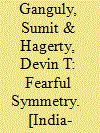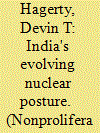| Srl | Item |
| 1 |
ID:
081891


|
|
|
|
|
| Publication |
2008.
|
| Summary/Abstract |
Bangladesh hovered between democracy and dictatorship in 2007. January elections were postponed, emergency rule was declared, and an army-supported caretaker government suspended political activity and launched a massive anti-corruption campaign. Former Prime Ministers Begum Khaleda Zia and Sheikh Hasina Wajed were jailed. The government pledged to hold elections by late 2008 after institutional reforms are in place
|
|
|
|
|
|
|
|
|
|
|
|
|
|
|
|
| 2 |
ID:
060483


|
|
|
|
|
| Publication |
New Delhi, Oxford University Press, 2005.
|
| Description |
x, 223p.
|
| Standard Number |
0195665864
|
|
|
|
|
|
|
|
|
|
|
|
Copies: C:1/I:0,R:0,Q:0
Circulation
| Accession# | Call# | Current Location | Status | Policy | Location |
| 049445 | 327.5405491/GAN 049445 | Main | On Shelf | General | |
|
|
|
|
| 3 |
ID:
140975


|
|
|
|
|
| Summary/Abstract |
This article analyzes India's nuclear doctrine, finding it to be critically flawed and inimical to strategic stability in South Asia. In pursuing an ambitious triad of nuclear forces, India is straying from the sensible course it charted after going overtly nuclear in 1998. In doing so, it is exacerbating the triangular nuclear dilemma stemming from India's simultaneous rivalries with China and Pakistan. Strategic instability is compounded by India's pursuit of conventional “proactive strategy options,” which have the potential to lead to uncontrollable nuclear escalation on the subcontinent. New Delhi should reaffirm and redefine its doctrine of minimum credible nuclear deterrence, based on small nuclear forces with sufficient redundancy and diversity to deter a first strike by either China or Pakistan. It should also reinvigorate its nuclear diplomacy and assume a leadership role in the evolving global nuclear weapon regime.
|
|
|
|
|
|
|
|
|
|
|
|
|
|
|
|
| 4 |
ID:
056290


|
|
|
|
|
| Publication |
2003.
|
| Summary/Abstract |
Washington refuses to chart a roadmap for peace in Kashmir. Although the chances for resolving the dispute are low, the probability of failure should not inhibit the US government from pursuing a more proactive role in resolving the conflict. The United States is the "sole pole" in a unipolar international system; regarding the world's thorniest disputes, it either leads or bears the brunt of its own passivity. Leadership requires more than devising policies that are guaranteed to work; it also involves taking risks on bold initiatives that may fail, but whose unlikely success would produce greater stability in global affairs. This article examines the admittedly slim prospects for settling the Kashmir dispute and the role Washington might play in such a process. It argues that only one conflict-resolution option seems even remotely viable: a phased conversion of the existing Kashmiri Line of Control into an internationally recognized Indo-Pakistani border.
|
|
|
|
|
|
|
|
|
|
|
|
|
|
|
|